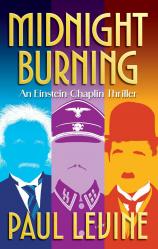Excerpt
Excerpt
Midnight Burning: An Einstein-Chaplin Thriller

1
I CAN SEE NOW
January 30, 1931
Sixth and Broadway, Downtown Los Angeles
Stylishly clad in tailored tuxedos, the two most famous men in the world stepped out of a Rolls-Royce limousine and waved to a joyous crowd.The throng surged forward, a tidal wave of twenty-five thousand souls crashing toward the overwhelmed police lines. “Smile, Albert,” Charlie Chaplin said. “You look terrified.”
“No more so than the Hebrews pursued by Pharaoh to the sea,” Albert Einstein said.
Flashbulbs popped. Women screamed. Men shouted “Huzzah!” Klieg lights swept across the Corinthian columns that towered above the theater marquee, which read: World Premiere Charlie Chaplin in “City Lights.” Policemen escorted the two men into the opulent movie palace, past the three-tiered fountain in the lobby, beneath an ornate chandelier, up the grand staircase to the mezza- nine to their seats in a cantilevered box close to the stage and screen.
With the lights not yet dimmed, the orchestra struck up the musical score. On its feet, the audience turned toward the mezzanine and applauded. Once again, both men waved, Chaplin smiling broadly. At forty-one, with a chiseled jaw and silver- streaked hair, he was movie-star handsome, looking nothing like the bedraggled Tramp of his films.
Einstein’s face flushed with embarrassment. The applause was not for him, and basking in its glow he felt like an imposter. At fifty-one, he sported a bushy mustache and wild, wiry, white hair that looked as if he’d jammed a finger into an electrical outlet. Though he still lived in Berlin, he was wintering in California while he lectured at Caltech, enjoying the celebrity that accompanied his theories of relativity, which had turned the world upside down. A few weeks earlier, when asked who he wanted to meet in Los Angeles, he mentioned only one name: Charlie Chaplin.
“What I most admire about your art,” Einstein said over the applause, “is its universality. You don’t say a word, yet the world understands you!”
“But your achievements are greater,” Chaplin replied. “The whole world admires you, even though nobody understands a word of what you say.”
Einstein laughed, the lights dimmed, and the projector rolled. Einstein sat transfixed, emotions churning, as the Tramp, smitten with a blind flower girl, endured derision, beatings, and prison to pay for the operation that would restore her sight. Believing all along that a wealthy man had been her benefactor, she finally realized in the last scene that the Tramp was her angel.
“You can see now?” the Tramp asks, via title cards on the screen. “Yes, I can see now,” she replies, wistfully.
A line steeped in deeper meanings, Einstein thought.
She sees the goodness in a man others scorned as downtrodden and undeserving of respect. She sees the power of his love and sacrifice for her. His compassion has enlightened her even more than the surgery.
Einstein wiped away tears as the screen faded to black. “Oh, Charlie, the humanity of your art,” he whispered. “I’ve never cried at a comedy before.”
“If you hadn’t cried,” Chaplin said, “I’m not sure we could be friends.
As the audience applauded and cheered yet again, Einstein clasped a hand on Chaplin’s shoulder. “Charlie, we shall be friends for a very long time.”
***
William Dudley Pelley, a screenwriter who had penned two Lon Chaney pictures but whose career had stalled like traffic at Hollywood and Vine, had neither laughed nor cried. From his perch on the second balcony, he scratched his graying mustache and silently fumed. City Lights was sappy—typical Chaplin pablum for the masses—and as for that rumpus in the street, slavish hero worship.
Chaplin’s a lucky duck, and life ain’t fair.
Both Pelley and Chaplin were born storytellers who had been raised in poverty. But Chaplin was a millionaire, and Pelley ate beans from a can. As the audience filed out of the theater, still buzzing with excitement, Pelley analyzed the picture.
So what’s your theme, Chaplin? That self-sacrifice is admirable, and good deeds are their own reward? Poppycock!
Pelley imagined himself a man of power and fortitude, so at odds with the Tramp’s empathy and tenderness. He believed he was destined for greatness but, at forty, knew that time was running short.
I ain’t bellyaching. I just need a cause.
He pictured mobs in the street, not enthralled by maudlin sentimentality but by righteous convictions. His followers would chant his name in reverence, would march under his banner.
He made a vow.
I will be a leader of men, and my glory will exceed Chaplin’s wildest dreams.
© 2025 Paul Levine. All rights reserved.
Midnight Burning: An Einstein-Chaplin Thriller
- Genres: Fiction, Historical Fiction, Historical Thriller, Suspense, Thriller
- paperback: 374 pages
- Publisher: Blank Slate Press
- ISBN-10: N/A
- ISBN-13: 9781943075966



